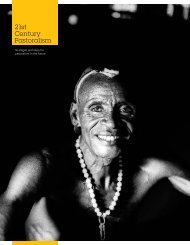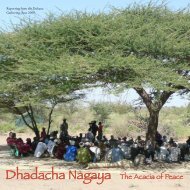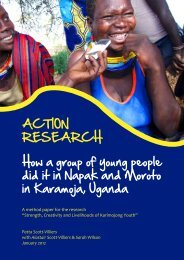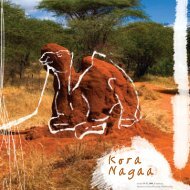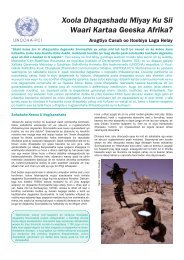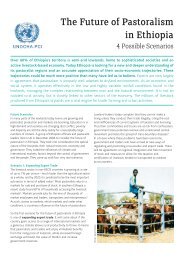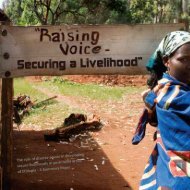Download PDF (212Kb) - the Website of the Pastoralist ...
Download PDF (212Kb) - the Website of the Pastoralist ...
Download PDF (212Kb) - the Website of the Pastoralist ...
Create successful ePaper yourself
Turn your PDF publications into a flip-book with our unique Google optimized e-Paper software.
Vulnerable Livelihoods in Somali Region, Issues Paper, March 2005<br />
Health<br />
High health risks and poor access to health services<br />
are a major source <strong>of</strong> vulnerability, as is evident in<br />
mortality data from our household survey. In urban<br />
Jigjiga, death rates peak among <strong>the</strong> over 60s, but in<br />
Gashamo and Kebribayah life expectancy is lower,<br />
and most deaths occur among children under 5. A<br />
high proportion <strong>of</strong> <strong>the</strong>se deaths are preventable. The<br />
most common causes are illness and disease, but in<br />
rural areas much reported premature mortality is due<br />
to malnutrition or famine, violent conflict, accidents,<br />
and deaths in childbirth. In Jigjiga town, by contrast,<br />
no deaths were attributed to malnutrition or conflict.<br />
Number <strong>of</strong> Deaths<br />
40<br />
35<br />
30<br />
25<br />
20<br />
15<br />
10<br />
5<br />
0<br />
Age Structure <strong>of</strong> Deaths, by District<br />
0-1 1-4 5-9 10-19 20-29 30-39 40-59 60-79 80+<br />
Almost twice as many deaths were reported by rural<br />
households than urban, which must be at least partly<br />
due to differential access to health services. Over<br />
90% <strong>of</strong> rural households stated that <strong>the</strong>y have no<br />
access to health services, while this figure was only<br />
5% in Jigjiga town.<br />
Also in Jigjiga, 58% <strong>of</strong> children had been vaccinated,<br />
but in Gashamo <strong>the</strong> figure was 33%; and in<br />
Kebribayah, 19%. Rural respondents <strong>of</strong>ten reported<br />
going for treatment to Somaliland, because this is <strong>the</strong><br />
closest health facility available to <strong>the</strong>m and because<br />
<strong>the</strong> quality <strong>of</strong> treatment is better.<br />
Health services in Somali Region must be improved.<br />
Investment in health is vital for development, and lack<br />
<strong>of</strong> access to basic health care is costing lives. It is not<br />
good enough to argue that pastoralist communities<br />
cannot be reached with public services because <strong>the</strong>y<br />
are <strong>of</strong>ten on <strong>the</strong> move. As one respondent told us:<br />
"There are mobile teams that visit <strong>the</strong> communities for<br />
vaccinations, like 'National Immunisation Day', and <strong>the</strong><br />
'Campaign Against Polio'. There is also <strong>the</strong> 'Eye Mobile'."<br />
Education<br />
Age Cohort<br />
Gashamo<br />
Kebribayah<br />
Jigjiga<br />
Literacy in Somali region is low, but is much higher in<br />
urban areas than rural areas. In Jigjiga town, half <strong>the</strong><br />
population sampled can read and write, but in rural<br />
Gashamo and Kebribayah, literacy is only 7%, and<br />
93% <strong>of</strong> people surveyed have never been to school.<br />
The reasons appear to be a combination <strong>of</strong> demand<br />
constraints (poverty, costs <strong>of</strong> education), and supply<br />
constraints (lack <strong>of</strong> schools and qualified teachers).<br />
Many parents expressed strong interest in educating<br />
<strong>the</strong>ir children, and complained about lack <strong>of</strong> access to<br />
schools. In many rural communities, school buildings<br />
are known jokingly as "hyena schools", as <strong>the</strong>y <strong>of</strong>ten<br />
stand unused. The drought also disrupted available<br />
education services, as parents withdrew <strong>the</strong>ir children<br />
because <strong>of</strong> hunger and inability to pay <strong>the</strong> costs <strong>of</strong><br />
fees, uniforms and school materials.<br />
Education is vital if rural households in Somali Region<br />
are to have access to alternative livelihoods, should<br />
pastoralism become too difficult. Without functional<br />
literacy, people who are "pulled" or "pushed" to urban<br />
areas have little prospect <strong>of</strong> securing employment,<br />
apart from low-return unskilled activities such as<br />
collecting firewood or carrying water. In Jigjiga town,<br />
schooling is seen as important for learning English.<br />
Drought Impacts and Responses<br />
Three <strong>of</strong> <strong>the</strong> last five years have been drought years<br />
in Somali Region. The 2004 drought was especially<br />
severe in Gashamo District, where livestock died in<br />
large numbers. The local name for <strong>the</strong> drought was<br />
Tuur ku qaad ("carry on your shoulder"), a comment<br />
on <strong>the</strong> fact that so many pack animals, even camels,<br />
died.<br />
Three in four rural households said <strong>the</strong>y had suffered<br />
hunger during <strong>the</strong> drought. Most adults in Gashamo<br />
and Kebribayah reported cutting down to one meal<br />
per day, while adults in Jigjiga continued eating three<br />
Households (%)<br />
What people said about education:<br />
• "Our children are our assets and educating <strong>the</strong>m<br />
is our priority - but where are <strong>the</strong> schools?"<br />
• "There is no school here, only one Quranic<br />
school."<br />
• "Since <strong>the</strong> drought, teachers cannot teach due to<br />
hunger, and students can't attend school - also<br />
because <strong>of</strong> hunger."<br />
80<br />
70<br />
60<br />
50<br />
40<br />
30<br />
20<br />
10<br />
0<br />
Adult Meals per Day, 2004 (worst month)<br />
Gashamo<br />
Kebribayah<br />
Jigjiga<br />
0 1 2 3



